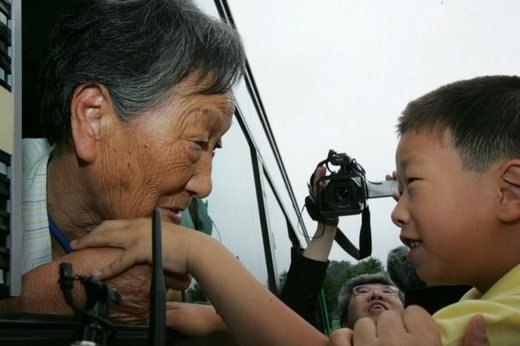 |
|
An elderly woman from South Korea says goodbye to her grandson at Mt. Geumgang on June 30. It has been 28 years since she met her son and grandchildren living in North Korea.
|
"At the (ministerial) talks your side even unilaterally refused to provide rice and fertilizers, an undertaking which has been underway between the North and the South as part of the humanitarian work on the principle of mutual help," Jang said. The divided Koreas have held 14 rounds of family reunions since the historic inter-Korean summit in 2000, but more than 90,000 from South Korea alone have remained separated from their loved ones since the end of 1950-53 Korean War. The latest round of the Red Cross-sponsored reunions was held in the North's Mt. Geumgang last month. The Unification Ministry said it will make full efforts to resume the inter-Korean family reunions. In an interview with a local TV station, Unification Minister Lee Jong-seok said the Seoul government will make efforts to resolve the issue of the two Koreas' separated families as soon as possible. "The government will try to solve the family reunion issue at an early date," Lee said. "I think humanitarian aid to the North should be resumed quickly." Expressing disappointment at the North's decision, a ministry official hoped that Pyongyang would try to create a favorable situation. "It is regrettable, although it was expected to some degree," said ministry spokesman Yang Chang-suk. "We hope that North Korea will also make efforts to turn the situation into a more favorable one so we can resume their aid shipments." South Korea's Red Cross was baffled by North Korea's unilateral suspension of inter-Korean family reunions, but said it will continue to prepare for the planned event. "It is not right (for North Korea) to unilaterally scrap the video reunion scheduled for Aug. 15," Han said. "The matter of separated families is a humanitarian issue." He said South Korea's Red Cross will soon send a reply to its North Korean counterpart to stress that the Koreas should continue to pursue humanitarian projects. South Korean political parties condemned the North's announcement, saying it runs counter to "the expectations of the 70-million Korean people." "It is deplorable for Pyongyang to inform Seoul of its decision," said Woo Sang-ho, spokesman of the ruling Uri Party. "Family reunions are a humanitarian move, so they should not be linked to any other issues." Criticizing the North Korean move as "another crime to the Korean people," the main opposition Grand National Party described it as clear proof that the Roh Moo-hyun administration's policy toward the North has totally failed. Last Thursday, minister-level talks between the divided Koreas came to an abrupt end, one day ahead of their original schedule, after they failed to find common ground on ways to resolve heightened tension following the North's missile launches on July 5. Before the start of the talks, South Korea said it would not make any additional commitments for economic or humanitarian assistance for the communist state until the dispute over the North's missile tests and its boycott of the long-running nuclear negotiations are fully and peacefully resolved. North Korea has been staying away from the nuclear negotiations since a November round despite repeated calls from its southern neighbor and other participants to resume the talks aimed at bringing a peaceful end to the nuclear dispute. The talks also involve the U.S., China, Japan and Russia. Seoul, July 19 (Yonhap News)






